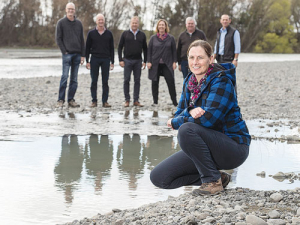Dairy leaders have come together with other livestock and farming leaders to pledge their commitment to swimmable rivers for future generations.
The Farming Leaders’ Pledge was signed last week by an informal group of New Zealand pastoral farming leaders who represent at least 80% of the country’s farmed land. They began work in May on issues of importance to farming.
The group’s commitment is to working to make NZ’s rivers swimmable for their children and grandchildren.
Speaking for the group is Federated Farmers president and dairy farmer Katie Milne; its other members are DairyNZ chairman Michael Spaans, Fonterra chairman and dairy farmer John Wilson, Mike Petersen (sheep and beef farmer), James Parsons (sheep and beef farmer and Beef + Lamb NZ chair), John Loughlin (Meat Industry Association chair) and Bruce Wills (sheep and beef farmer and Ravensdown director).
DairyNZ chair Michael Spaans says “this is a clear message from NZ’s farming leaders that we want our rivers to be in a better state than they are now, and agriculture needs to help get them there”.
“I have joined my fellow leaders to stand up and say that I want my grandchildren, and one day my great grandchildren, to be able to swim in the same rivers I did growing up,” he says.
“I don’t know one farmer who doesn’t care deeply about their land and who doesn’t want to leave it in a better state than they came to it.”
DairyNZ chief executive Dr Tim Mackle says “dairy has been on this journey for many years and I’m proud of what our farmers have achieved so far. More work is required and we need to keep going forward”.
“At the launch of the third year of results of the Sustainable Dairy Water Accord in May, the dairy sector celebrated that 97% of dairy waterways are excluded from dairy cattle. Dairy waterways are planted with millions of native trees to create strong riparian margins to ‘sop up’ nutrients. And as of June last year, almost 27,000km of dairy waterways had been fenced, and more than 99.4% of 44,386 regular stock crossing points on dairy farms now have bridges or culverts.
“Our farmers have personally invested over $1 billion to protect their waterways by planting and fencing their riparian margins. DairyNZ has spent more than $18.5 million on research and development, and a further $10.6 million on environmental work last year. Even with this investment and a strong commitment to nutrient and effluent management, we are still not where we need to be.
“We are all committed to playing our part to help create a better NZ for everyone.”
Milne says the intention behind the pledge is clear.
“Many of our rivers are not in the condition we all want them to be. We are doing this because we want our kids and their kids to be able to swim in the same rivers we did as children; and by swim we mean swim, it’s as simple as that.
“We’re standing up and saying we haven’t always got this right. More work is required and we will play our part. While there has been progress on farms in the past 10 years, we know there is more to be done and that it must be done fast and together.
“Today isn’t about laying out the detail on the huge amount of work going on already on farms up and down the country and how these efforts will need to increase. It’s about us as farming leaders signalling our commitment to making NZ’s rivers swimmable and doing everything we can to achieve that.”
Katie Milne says the group understands much of the work needed will be challenging for the farming sector.
“We haven’t put a timeline on our commitment. Each community will need to decide that for themselves. This goal will be difficult to meet and we don’t have all the answers today on how it’s going to be achieved,” she says.
“We know we have work to do. We know it will be challenging for farmers. We know the answers are complex and we don’t have them all now. This commitment is simply the right thing to do in playing our part to give back to future generations what we enjoyed as kids.”


















